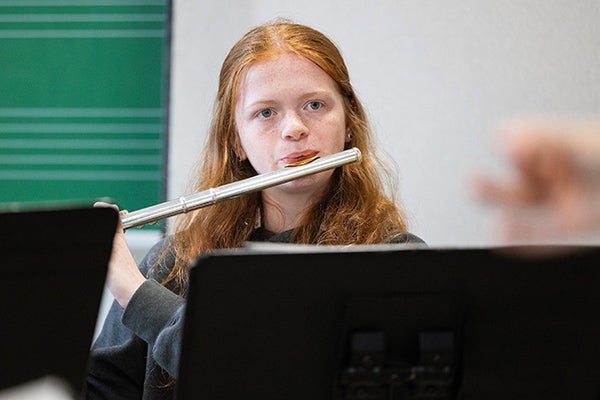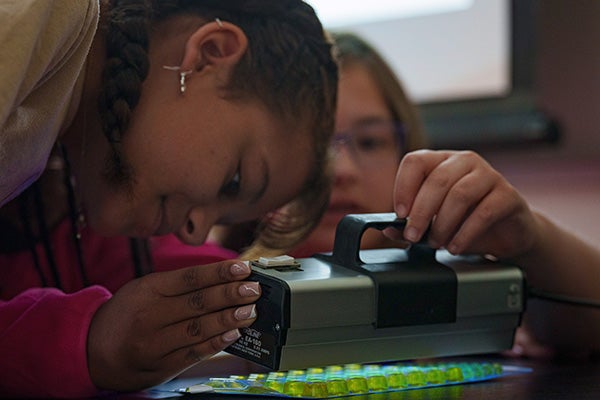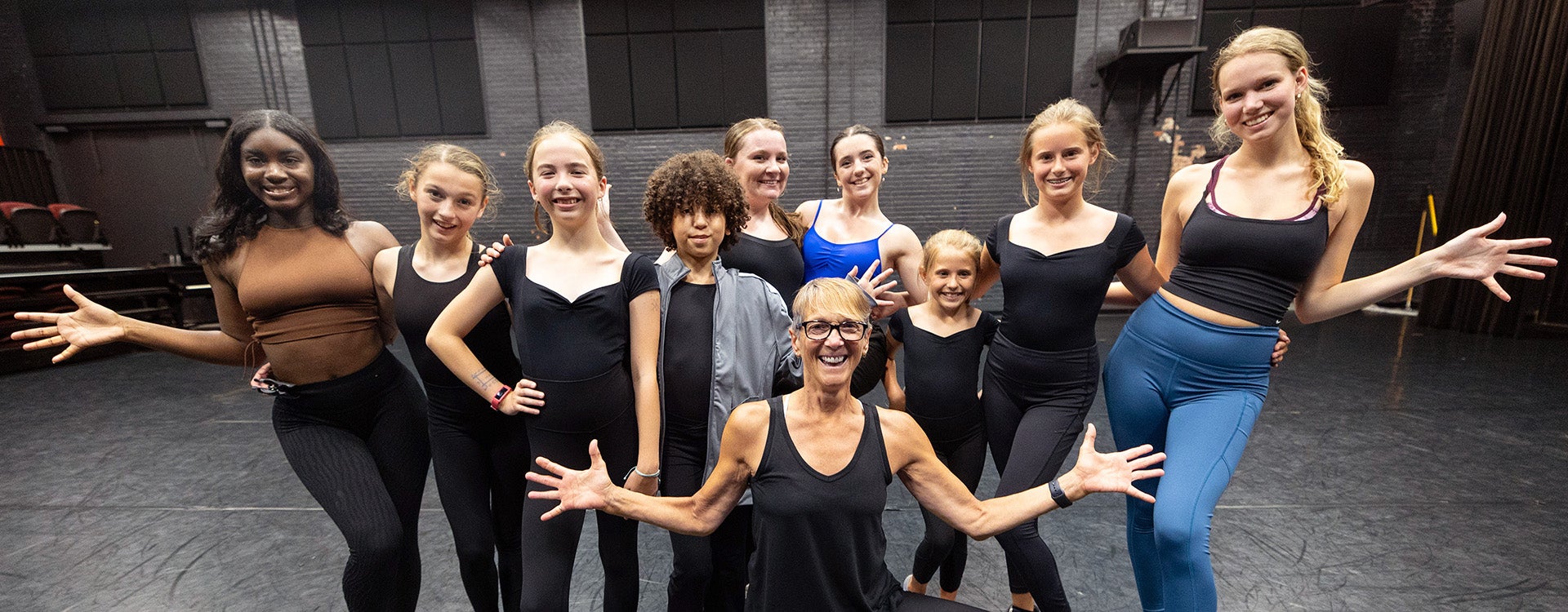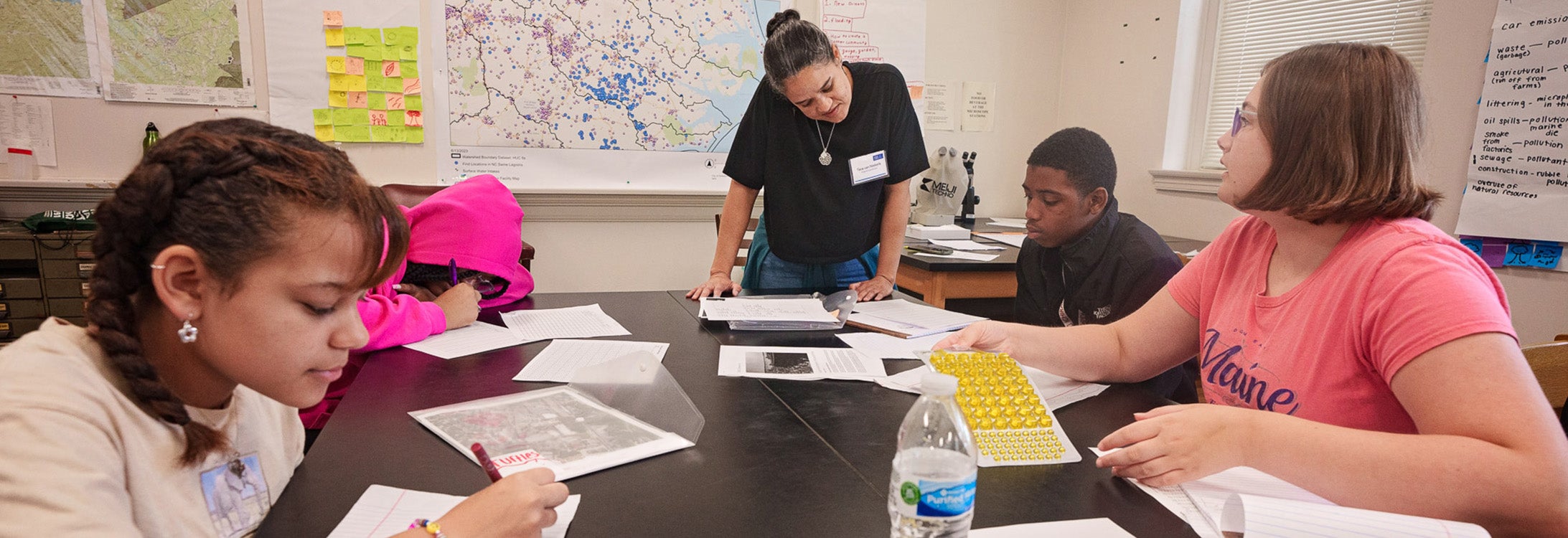SUMMER CAMP
Students explore interests, life at ECU through summer camps
While East Carolina University students have been away from campus, faculty members welcomed K-12 summer campers who explored college life and a range of interests from technology to music.
Students have created memories and formed new friendships through shared activities while learning or perfecting skills in on-campus day or residential camps. The camps reach hundreds of young people who one day may decide to attend ECU because of their summer experience.
Band Camp
ECU Summer Band Camp has been a family tradition for 15-year-old Avery Stroud, a sophomore at West Carteret High School in Morehead City. Her father, ECU alumnus and Newport Middle School band director Dave Stroud, has taught at the camp for several years and her brothers attended before she was old enough to go.

Avery Stroud of Morehead City plays flute during summer band camp in Fletcher. (ECU photo by Rhett Butler)
Stroud was one of 385 participants who filled Fletcher Music Hall and Ballard Residence Hall, where students lived the week of June 18.
Students could choose among several tracks from jazz to concert band. New this year was color guard, which met on the Marching Pirates’ practice field and in Christenbury Gym. The camp’s format in the School of Music gives students the opportunity for one-on-one coaching with ECU faculty members and three hours of daily rehearsal, said Bill Staub, director of bands at ECU.
“Everyone gets a large amount of music, and they get to play a lot, so when they’re done they’re probably in the best musical shape of their lives because they’ve been playing all week,” he said.
Stroud said she usually practices flute three or four days a week during the summer to prepare for high school marching band, regular band and All-District. At camp, she said she enjoyed getting to meet new people, playing in a quintet and rehearsing with other students.
Stroud is already thinking about attending ECU. “I know that ECU is one of the top music colleges, and I think I probably want to go into music education or music performance, and I thought this would be the best place to go,” she said.
Summer camp is a great introduction to ECU. “Every single horn player who’s coming this fall attended band camp,” Staub said.
One of those is Sarah Crocker, an incoming ECU music major and Honors College freshman. Crocker attended band camp every summer starting in seventh grade (except for 2020 when COVID canceled camp).
“My experience at ECU band camp is what ultimately sealed my decision to come to ECU,” Crocker said. “It was an unmatched experience and I had so much fun. I learned so much and I would not trade that experience for the world.
“At camp, you live on campus for a week and get to eat at the dining halls, go to Fletcher music building and even the rec center or the student center. Getting to experience that was a lot of fun, and I loved all the things that I got to do,” she said.
Crocker, who graduated from Havelock High School, said she looks forward to being a member of the Marching Pirates, making new friends and enjoying the college experience when ECU classes start Aug. 21.
Renewable Energy and Green Manufacturing Academy
Amid all the wires, panels and connectors, Liliana Sherman had the best piece of equipment possible as she worked on a solar energy experiment inside an ECU lab — a pair of sunglasses.
“It was just an outfit choice, and then it was like, ‘Oh, that’s a bright light,’ so I put my sunglasses on,” Sherman said.
She was among more than 20 Pitt County middle school students who participated in the Department of Technology Systems’ Renewable Energy and Green Manufacturing Academy.
With support from the Burroughs Wellcome Fund, the two-week summer day camp focused on renewable energy technologies such as solar, wind and hydrokinetics through hands-on learning modules, presentations and field trips.
Ranjeet Agarwala, associate professor in the Department of Technology Systems, organized the camp.
“We all know the importance of saving energy,” he said. “If not, there is a price tag. Over time, it will be depleted. … We have to live within our means. This camp is just a small part to make sure future generations will have the air we breathe and the water we drink.”
Community Science Camp
Water also was a topic in the Community Science Camp organized by the ECU Water Resources Center and supported by the National Science Foundation’s Coastlines and People program. The free, weeklong residential camp was open to seventh through 12th graders who collected water from different sources that was analyzed in classrooms and labs in the Graham Building.

Students in the Community Science Camp analyze water samples. (ECU photo by Cliff Hollis)
Students developed skills using scientific equipment, GIS tools, data software, virtual reality (VR) technology, mobile devices and photography.
“I learned not everyone has to be a scientist. You can just conduct studies as a normal citizen,” said 13-year-old Gentle Haze of Greenville.
“I learned a lot about water that I didn’t know and why that matters. Certain areas have different water salinity,” said Bryan O’Neal, 14, of Ocracoke. “I also learned more about how to predict flooding.”
“We also learned how salty water keeps coming more inland, and it’s bad for the environment,” Haze said. “I liked that we actually got to go out into the field.”
Participants collected water from different sources across campus and at Greens Mill Run and tested for nitrate, nitrite, pH, chloride and E. coli. Students got excited when one sample tested positive for E. coli.
Outside of class, students enjoyed living in the residence hall, meeting people, eating in the dining hall, and playing volleyball and basketball in the student rec center.
“I really like this camp. It’s really given me a demo of what it would be like going to ECU,” O’Neal said.
Jazz Dance Camp
Getting a closer look at ECU was one reason why Reese White, a senior at Hertford County Early College, wanted to participate in Summer Jazz Dance Camp in the School of Theatre and Dance. White needed a summer intensive as part of her dance instruction. “It was a requirement to do one and I thought ‘I’m a senior, let me look at the colleges first since I can get to know what their dance programs are like, and see what I like, and which school I want to go to,’” she said. “I’ve really looked a lot at ECU, and I really like this class.”
ECU faculty member Tommi Galaska and ECU senior dance majors Amani Faulk and Samantha Pabst taught dancers all styles of jazz dance — classical, contemporary, lyrical, musical theater and hip hop — with an emphasis on technique. This includes core and upper body strengthening. Galaska commended the ECU students who are trained in all styles and can teach them all.
“I think as a dancer, you’re always going to have to teach at some point, and luckily I do enjoy teaching. There’s no better way to get better at it than doing it alongside Tommi Galaska,” Pabst said.

Jazz Dance Camp participants gather for a class photo with instructors Tommi Galaska, center, and ECU senior dance majors Amani Faulk, far left, and Samantha Pabst, far right. (ECU photo by Rhett Butler)
“I can attest to that. It’s always great to be with Tommi,” Faulk said. “Also getting to know the kids. They’re awesome. I enjoy teaching too. This has been a really good experience.”
Ivy Bowers of Greenville said she wanted to attend camp to get stronger in jazz. She will be taking dance at D.H. Conley under ECU alumna Holly Alligood. Bowers and her sister, Taylor, attended ECU’s Spring Dance Concert in March with their mom. They liked it so much that they wanted to attend summer camp.
Dayva Sugg of Snow Hill is a returning camper who last participated before the pandemic, before she was in high school. Now a rising 11th grader, she’s looking at attending ECU and would like to be a dance teacher.
Summer Innovation Camp
Sixteen Pitt County high school students spent five days in July learning about entrepreneurship and all that’s involved in helping turn an idea into a reality. The annual Summer Innovation Academy is a free and weeklong program hosted by the College of Business Miller School of Entrepreneurship.
Desiree Coles, a junior at South Central High School, attended the academy for the first time. Going into it, she was aware of the idea of being an entrepreneur. “It came from my dad, but it also came from me wanting to be my own boss and have my own product,” she said.
Her product idea is to add an eyeglass attachment to goggles that will help swimmers see underwater.
“Before the Summer Innovation Academy, I had the idea in mind, but I never really took a step forward. The academy is helping me take that step forward; helping me realize what my target audience is, my financial needs, how to pitch, how to patent and trademark and protect my product,” Coles said.
Another first-time participant and South Central junior, Isaiah Godley, has an idea to manufacture recovery wear, such as an ankle brace, that is comfortable and can be personalized.
“I came to my idea after I got hurt (playing basketball). When I was playing (after the injury), I put on an ankle brace, and it wasn’t the same. It wasn’t comfortable. When I sat down and thought about it, I thought, ‘How can I make this better and make it better for the customer?’”
Godley said the academy has helped him learn “how to put the (entrepreneurial) puzzle pieces together. I’ve met a few contacts that I can ask for advice” to achieve his ultimate goal of having his product on store shelves.
STEMx
Middle and high school students from five economically distressed Tier 1 North Carolina counties made up the STEMx training and hackathon youth camp in the Department of Technology Systems.
The Department of Defense’s Chief Digital and Artificial Intelligence Office, ECU’s Office of National Security and Industry Initiatives in the Office of Research, Economic Development and Engagement, the NCEast Alliance and Trenchant Analytics supported the camp designed to inspire students to attend college and choose a career in STEM. The 16 students worked with computer programming and coding, learned about robotics, heard from industry experts, toured a Hyster-Yale facility and will later this week participate in a hackathon in which teams compete using computer programming.
“I really like that we were able to do hands-on stuff and do it on our own with help after they explained what it is,” said Kara Williams, 16, from the Lake Mattamuskeet area. “Working with Python (programming), they explained what it was, but then we got to work with it.”
The campers stayed in residence halls for the week and enjoyed social activities that included basketball, pickleball and dinners together. They also designed and printed their own camp T-shirts in the Isley Innovation Hub.
MORE STORIES
